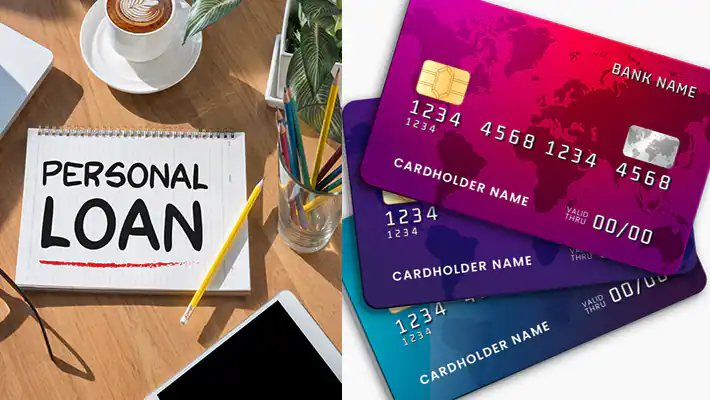Are Credit Cards Considered a Personal Loan?

Credit cards and personal loans are two common ways to borrow money, but they are not the same. Each serves a different purpose, works differently, and suits different financial needs. In this article, we will explore whether credit cards are considered personal loans, how they differ, and how to decide which is right for you.
When people need money for expenses, they often think about credit cards and personal loans. Both let you borrow money, but they are designed for different situations. This article will break down their features to help you understand their differences.
What Is a Credit Card?
A credit card is a type of revolving credit. It allows you to borrow money up to a specific limit, which you can use repeatedly as long as you pay off your balance.
Key Features of Credit Cards:
- Credit Limit: Each card has a borrowing limit set by the issuer.
- Minimum Payment: You must pay at least a small portion of your balance each month.
- Interest Rates: If you don’t pay the full balance, you are charged interest, often at a higher rate.
- Rewards: Many credit cards offer perks like cashback, travel points, or discounts.
Credit cards are best for short-term borrowing or emergencies. They also help build your credit score if used responsibly.
What Is a Personal Loan?
A personal loan is a fixed amount of money borrowed from a lender, such as a bank or online lender, which you repay in equal installments over a set period.
Key Features of Personal Loans:
- Loan Amount: You borrow a lump sum, often ranging from $1,000 to $50,000.
- Repayment Period: Loans are repaid over a fixed term, usually 1 to 5 years.
- Interest Rates: They usually have lower interest rates than credit cards, especially for borrowers with good credit.
- Purpose: Personal loans are often used for significant expenses, such as home improvements, debt consolidation, or medical bills.
Personal loans are ideal for long-term financial needs where you need a clear repayment plan.
Are Credit Cards Considered a Personal Loan?
No, credit cards are not considered personal loans. While both involve borrowing money, their structures and purposes are entirely different.
Major Differences Between Credit Cards and Personal Loans:
- Type of Credit:
- Credit cards are revolving credit, meaning you can borrow repeatedly up to a limit.
- Personal loans are installment credit, meaning you borrow a fixed amount and repay it over time.
- Repayment Terms:
- Credit cards allow flexible payments, with a minimum due each month.
- Personal loans require fixed monthly payments until the debt is fully repaid.
- Interest Rates:
- Credit cards often have higher interest rates, especially on unpaid balances.
- Personal loans usually have lower interest rates, depending on your creditworthiness.
- Purpose:
- Credit cards are used for everyday purchases and short-term needs.
- Personal loans are better for larger, planned expenses.
Advantages of Credit Cards vs. Personal Loans
Advantages of Credit Cards:
- Convenience: Easy to use for daily transactions and emergencies.
- Rewards and Perks: Cashback, miles, or points can add value.
- Flexible Payments: No fixed repayment schedule, though interest can accumulate.
Advantages of Personal Loans:
- Lower Interest Rates: Especially beneficial for consolidating high-interest debt.
- Structured Repayment: Fixed payments make it easier to budget.
- Larger Loan Amounts: Useful for major purchases or life events.
When Should You Use a Credit Card?
- For small, everyday expenses.
- When you can pay off the balance in full each month to avoid interest.
- To earn rewards on purchases.
- For short-term emergencies like unexpected bills.
When Should You Use a Personal Loan?
- For planned expenses like home renovations or weddings.
- To consolidate high-interest debts into a lower-interest loan.
- When you need a fixed repayment plan and a clear payoff date.
Which Is Better: Credit Cards or Personal Loans?
The answer depends on your financial needs and habits:
- Use a credit card if you need flexibility, can manage monthly payments, and want rewards.
- Choose a personal loan for larger, planned expenses and lower interest rates.
FAQs About Credit Cards and Personal Loans
1. Can I use a personal loan to pay off credit card debt?
Yes, consolidating credit card debt with a personal loan can save you money on interest and simplify payments.
2. Do credit cards affect my credit score?
Yes, your credit card usage, payment history, and credit utilization ratio impact your credit score.
3. Are personal loans better for bad credit?
Personal loans may be an option for bad credit, but expect higher interest rates. Secured loans or credit-builder loans might be better alternatives.
4. Can I use a credit card for a large purchase?
Yes, but be cautious of high-interest rates if you cannot pay off the balance quickly.
5. Which option is easier to qualify for?
Credit cards may be easier to get for small limits, while personal loans typically require a better credit score for large amounts.
Conclusion
Credit cards and personal loans are valuable financial tools, but they serve different purposes. Credit cards are not personal loans—they are revolving credit with flexible payments, while personal loans are installment credit with fixed terms. Understanding the differences can help you make smarter financial decisions.
Whether you choose a credit card or a personal loan, always borrow responsibly and ensure you can repay the money on time. This will protect your credit score and financial health.



